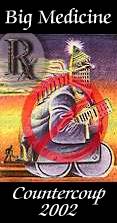TIMELINE OF PERSONHOOD RIGHTS
by Rick Beach and Jan Edwards
|
PEOPLE GAIN OR LOSE
RIGHTS
|
YEAR
|
CORPORATIONS GAIN
OR LOSE RIGHTS |
NOTE/GENERAL
|
|
|
1776
|
|
Revolutionary War begins
|
|
Bill of Rights - White males of property over 21
(literacy, poll taxes)
|
1791
|
Constitution
|
|
|
|
1803
|
Marbury v. Madison - Supreme Court becomes
Supreme
|
|
|
|
1819
|
Dartmouth College v. Woodward - A
corporate charter is a contract and can't be altered by
government
|
|
|
Dred Scott - Slaves are Property and Congress
cannot deprive citizens of their property. Slaves are not citizens of any
State.
|
1857
|
|
|
|
|
1861
|
|
Civil War begins
|
|
13th Amendment - Slavery
abolished
|
1865
|
|
|
|
14th Amendment - Black males get equal
protection
|
1868
|
Paul v. Virginia - Corporations NOT
persons under Article IV, Section 2
|
|
|
15th Amendment - Black males
vote
|
1870
|
|
|
|
Minor v. Happersett - Women seek 14th
Amendment but NO - only for black males
|
1874
|
|
|
|
|
1877
|
Munn V. Illinois - 14th Amendment CANNOT
be used to protect corporations from state law, but didn't actually rule on
personhood
|
|
|
|
1886
|
Santa Clara County v. Southern Pacific
Railroad - Corporations get personhood under the 14th
Amendment
|
|
|
|
1890
|
Sherman Anti-Trust Act - Sections 7&8 define
corporations as persons
|
Of the 14th Amendment cases brought before
Supreme Court between 1890 and 1910, 19 dealt with Negroes, 288 dealt with
corporations
|
|
|
1893
|
Noble v. Union River Logging - 5th
Amendment (due process) - first Bill of Rights
|
|
|
Plessy v. Ferguson –
“Separate but equal” - black males lose 14th amendment
rights
|
1896
|
|
|
|
|
1906
|
Hale v. Henkle - Corporations get 4th
Amendment "search and seizure" protection
|
|
|
|
1910
|
|
|
|
19th Amendment - Women get the
vote
|
1920
|
|
|
|
|
1925
|
Gitlow rules constitutional protections for
corporations include 14th Amendment, press, speech, and 5th
Amendment
|
|
|
Supreme Court Justice Hugo Black challenges
corporate personhood - dissent Connecticut General Life Insurance v.
Johnson
|
1938
|
The Corporation won this case
|
|
|
Supreme Court Justice William O. Douglas
dissents Wheeling Steel Corporation v. Glander
|
1949
|
The Corporation won this case
|
|
|
Brown v. Board of Education - "Separate
is not equal"
|
1954
|
|
|
|
24th Amendment - No poll
taxes
|
1964
|
|
|
|
26th Amendment - 18-year-olds vote.
Women included in 14th
Amendment
|
1971
|
|
|
|
|
1976
|
Buckley v. Valeo - money equals
speech
|
|
|
|
1976
|
US v. Martin Linen Supply - corporation
uses 5th Amendment to protect against double jeopardy to avoid retrial in
anti-trust case
|
|
|
Slavery is the legal fiction
that a person is property.
Corporate Personhood is the
legal
fiction that property is a
person.
|
1976
|
Virginia Board of Pharmacy v. Virginia
Consumer Council - Advertising is free speech. [Commercial
Speech]
|
|
|
|
1977
|
Marshall v. Barlow - 4th Amendment used to
thwart federal occupational health and safety inspections
|
|
|
|
1977
|
First National Bank of Boston v. Bellotti
- 1st Amendment used to overturn state restrictions on corporate spending on
political referenda
|
|

